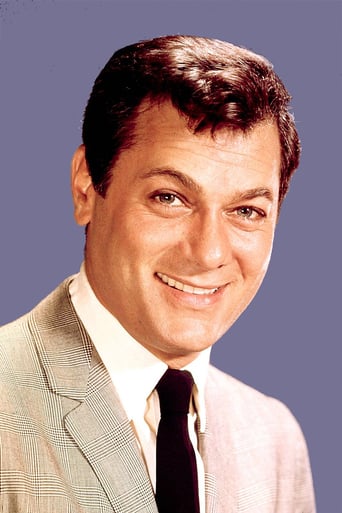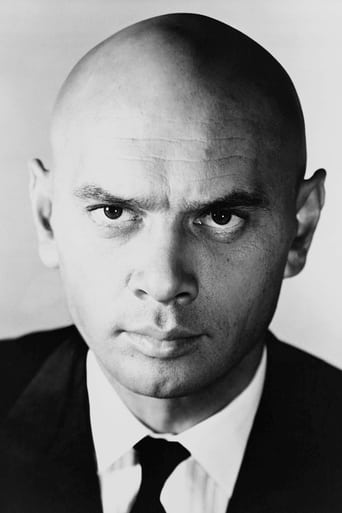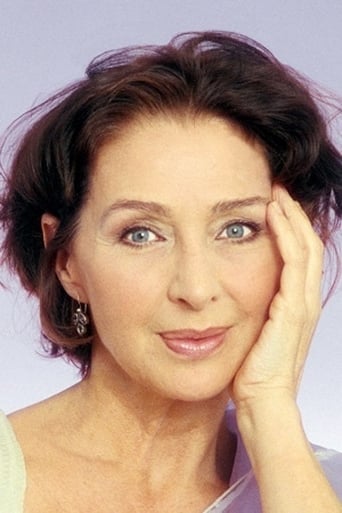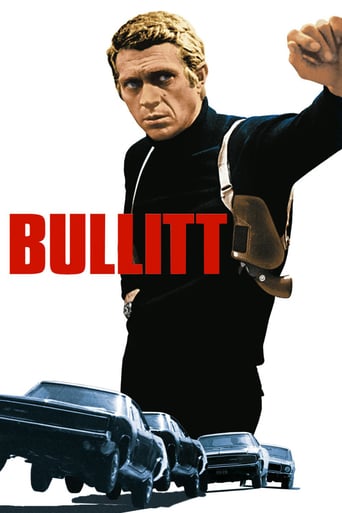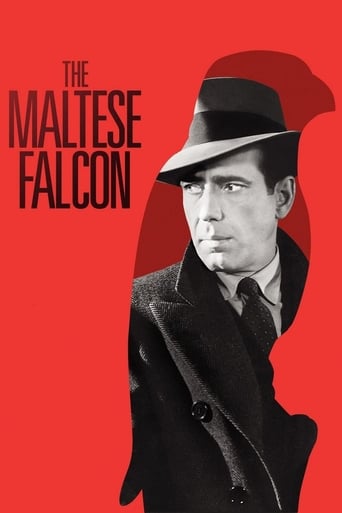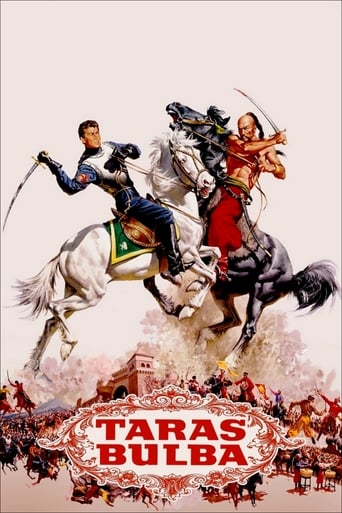
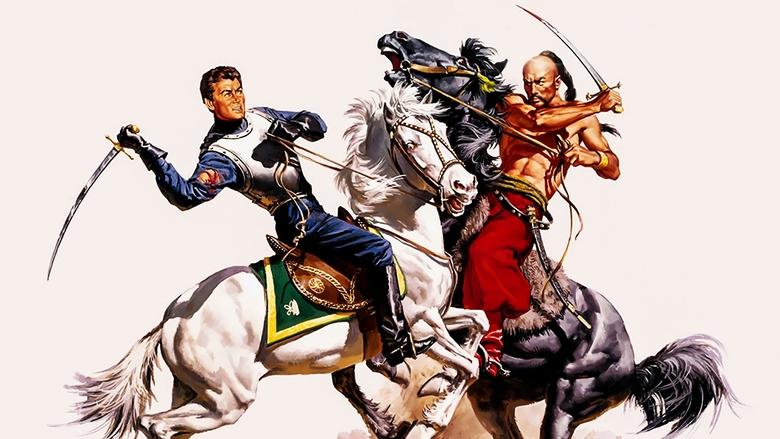
Taras Bulba (1962)
Ukraine, 16th century. While the Poles dominate the Cossack steppes, Andrei, son of Taras Bulba, a Cossack leader, must choose between his love for his family and his folk and his passion for a Polish woman.
Watch Trailer
Cast
Similar titles
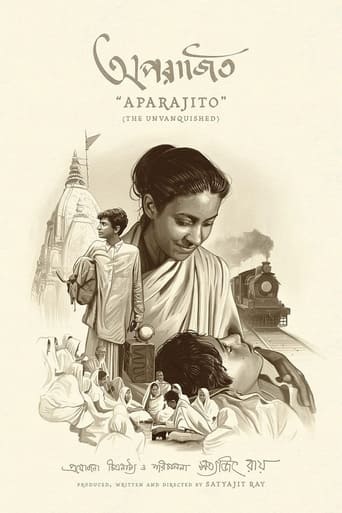
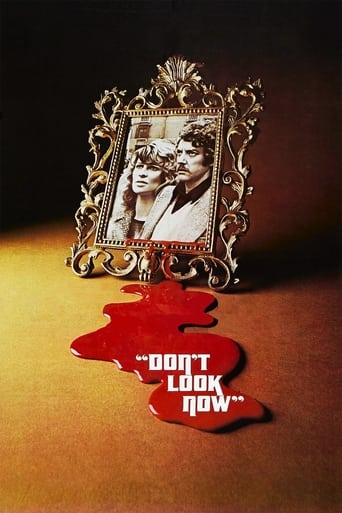
Reviews
Terrible acting, screenplay and direction.
It’s not bad or unwatchable but despite the amplitude of the spectacle, the end result is underwhelming.
There are moments that feel comical, some horrific, and some downright inspiring but the tonal shifts hardly matter as the end results come to a film that's perfect for this time.
Through painfully honest and emotional moments, the movie becomes irresistibly relatable
a beautiful film like many from the same period. good adaptation of Gogol's novel, remember of Ukraina's past, great battle scenes and romanticism in great doses. a film who represents the sensitivity of a time, with same ambition to be memorable, with same force of image and cast, a fairy tale who must impress and to be result of same rules who use same ingredients. so, it is not difficult to analyze its sins, errors or mistakes. but it is the wrong way in this case. because the purpose is clear - enjoy the film, admire the costumes and the fights, be part of story , near the anger of father or the foolish love of the son. sure, Yul Brynner is not exactly Taras Bulba . but its job is right and that is only important thing. so, a good movie. maybe for remember the beauty of a lost world/sensitivity.
Taras Bulba is directed by J. Lee Thompson and adapted to the screen by Waldo Salt and Karl Tunberg from a story by Nikolai Gogol. It stars Yul Brynner, Tony Curtis, Christine Kaufmann and Perry Lopez. Out of United Artists, it's a DeLuxe/Eastman Color/Panavision production, with the music scored by Franz Waxman and cinematography by Joseph MacDonald.Loosely based on Gogol's short novel, story tells of a Cossack uprising against the Polish forces who have taken control of the Ukraine. At the centre of the Cossack army is the leader Taras (Brynner) and his two sons, Andrei (Curtis) and Ostap (Lopez). But when Andrei falls in love with a Polish princess called Natalia (Kaufmann), it sets the wheels in motion for the Bulba family to crack from within; just as the Polish come calling asking for the Cossacks help to defeat the Turkish.While not as epic as the film, the troubled back story of the production is big enough to lend one to understand why Taras Bulba is not the grandiose picture the story deserves. Main problem comes with casting, particularly that of Curtis as the elder Bulba son. It should have been Burt Lancaster, who walked, so in came Curtis and a decision was made to put him front and centre of the picture. Thus rendering Brynner's title character to playing second fiddle, so much so they really should have called the film Andrei Bulba instead. On his day Curtis could act, but he's out of place here playing a Cossack with brain and brawn. Then there was the small matter of Curtis' marriage to Janet Leigh falling apart, with Leigh visiting the set, falling ill and no doubt noticing the sparks flying between Curtis and his delectable co-star, Kaufmann. Curtis would say it wasn't the final straw, but with him going on to marry Kaufman shortly after his divorce, it's hard not to think that it sealed the deal!He's not helped by the writers, though, who allow the love story sub-plot between Andrei and Natalia to form the core of the plot. They too, Messrs Salt & Tunberg, were brought in after historical novelist Howard Fast (Spartacus) refused to tone down the screenplay. He wanted to include what was an important part of the Cossack/Pole war, that of the Cossacks anti-Semitic attack on Polish Jews. The makers balked and Salt & Tunberg came in and delivered the Andrei overkill and some rather cheese laden dialogue. Brynner was crushed, his biography (written by his son Rock) reveals that it was a role and film he cared for more than any other, he had grand plans for the portrayal but the makers didn't share his view. A shame because what we do get of Brynner is wonderfully exuberant, muscular and (correctly) scene stealing.However, when Taras Bulba as a film is good, it's real good, and thankfully it's never dull, even if it's it a bit more jovial in the mid section than it is meant to be. Thompson was a fine director of action and suspense, and he gets to flex his muscles here to great effect. Casting aside the cheap shots of dummies and wooden horses being hurled about a couple of times, the sight of thousands of men on horseback swarming across the Steppes (actual location used was Argentina) is spectacular. The battles are fierce, violent and gripping, while the scenes in the Cossacks camps are joyous as men drink, sing, test their manhood by doing things like dangling over a bear pit, it's all very robust and Vikingesque, but entertainingly so. There's even some dashing sword play, while quality suspense is eked out during a challenge to the death over a seemingly bottomless gorge.Joseph MacDonald's Panavision photography neatly brings the wide vistas to life, aided by the use of Eastman Color which gives off a nice period hue. Waxman delivers a blunderbuss score that's seasoned with Russian vitality, while the costume department deserves a mention for their efforts, particularly for the Polish army who look dandy men of steel. Yes it's a film of flaws and bad decisions, but the good does outweigh the bad in this instance, and how nice it is to have the chance to see a little known part of "bloody" history up there on the screen. 7/10
Borrowing from Gogol the title ,the proper nouns and the son's killing,Jack Lee Thompson's movie is quite entertaining,ideal for a rainy day or after a hard day's work.The first part is the most interesting: the scenes at the university with its sadistic monks -while one of them is flogging the rebel students,the other kneels down and pray- and its "racism" : a lot of Pole Students cannot accept the fact that those primitive savage cossacks study in their school.Curtis was almost emasculated "to prevent him from sullying Pole girls." It sometimes recalls"Romeo and Juliette",which Christine Kaufman's resemblance with Olivia Hussey who would play the part of Juliette six years later reinforces.Yul Brynner is ideally cast as Taras.The 1936 French version ("Tarass Boulba" French spelling)mainly deals with the second part -the siege- and the stories are similar with the same love interest.
While I admire Yul Brynner as Bulba, as well as those breathtaking battle scenes, I must say some idiotic historical inaccuracies in this movie took out a bit of fun while watching it.1st of all, costumes. Especially those silly Russian-style shirts on both sons in tavern scene. Polish army outfits.2nd - cossacks (ukrainian Cossacks - NOT Russian cossacks) were mostly infantry, they were renowned by being best foot-soldiers of their time. While many horse raiders look great on widescreen it's not really true.3rd - some music used in movie is actually Russian! Ukrainian Cossacks from 16th century sing Russian song from 19th century??? Kalinka-Malinka is NOT Ukrainian song! In general, while watching this movie I see a lot of Russian-based influences, interesting where and why they came from. In 16th century Russia was unimportant and weak country, still bearing heritage of Kyiv Rus' and paying tribute to Golden Horde in order to survive. Hence she has no significant, if at all, influence on her neighbors. But in movie we see Brynner speak with Russian accent, Cossacks sing Russian songs and dancing weird dances (this is NOT hopak, Ukrainian traditional dance) What we see here is yet another example of old Hollywood blockbuster movie made without serious historical research, and yes, it's really great that to-day movies are made using totally different approach - instant examples are Gladiator, Rome TV-series or With Fire and Sword.All in all, movie is good, but remember: Ukrainians are NOT Russians, and in Ukrainian language Zaporostsi is pronounced Za-po-ro-zh-tsee.
